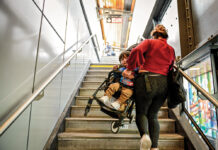New polling conducted by YouGov on behalf of T4America and our partners finds that Americans support expanding public transit by a 77-15 margin—even as many transit agencies face a growing generational funding crisis brought on by COVID-19.
Americans want a better transportation system that provides them meaningful options. This week, we released new polling results alongside our partners at TransitCenter, Data for Progress, the Ian L. McHarg Center for Urbanism and Ecology, and the Socio-Spatial Climate Collaborative. It helps us answer a crucial question: what do voters really want out of our transportation system?
Unsurprisingly, voters want more transportation options and to see tangible outcomes from their investments in the system.
The data reinforces many of the same results we’ve seen in our polling over the years: voters are prepared to spend more on public transit and want to orient government spending toward improving existing infrastructure. While many rely on cars, a majority said they want to have other options to get around each day. Democrats and Republicans agree that the government should be prioritizing fixing our roads and helping with congestion in our cities.
For too many, driving is the only option
Car use is prevalent among voters in the United States, but that doesn’t mean that everyone wants to drive everywhere, all the time, for every single trip. Far from it. By and large, voters feel they have insufficient alternatives to driving and have no choice but to use their cars as much as they do.
Among those who reported a car was their primary mode of transportation, about 80 percent agreed that they have “no choice” but to drive as much as they do. Just over half of car users report wishing they had more options, and about the same share of car owners said that public transit was not convenient for their needs.
Surprisingly, voters on net support a policy to reduce the number of personal automobiles on the road. By a 47-38 margin voters agree that the government should aim to reduce the number of vehicles in the U.S. over the next few years. This includes a clear 68-12 net support among Democrats and 43-38 net positive support among Independents as well. About 23 percent of Republicans somewhat or strongly agreed with the statement.
Voters want more options, but are they willing to pay for transit? The answer is a resounding “yes!”
Voters support transit
Even though many Americans don’t have access to a convenient transit network, they still believe transit has enormous benefits. The polling shows that 66 percent of voters believe their own communities would benefit from expanding public transit while about 77 percent of voters believe the US overall would benefit from expanding public transit. This support includes near unanimity among Democrats, 90 percent of whom agree.
Overall, Americans clearly support having better public transportation systems. This basic conclusion is robust across a variety of political, demographic, and geographic factors.
To have better public transit, people are willing to pay for it. Nearly four times as many voters support increasing public transportation funding as support reducing it. There’s even no appetite for cuts to investments in public transportation, even accounting for party identification and geography. Less than 1 in 5 Republicans support cutting transportation spending. As recent historical data has borne out, when voters go to the ballot to raise taxes to invest in transit, those measures pass at around a 70 percent clip.
Across the political spectrum, voters support increasing funding by a 77-15 margin. When asked how much should be spent on public transportation, the average response was $0.33 of every federal transportation dollar; current public transportation spending is only about $0.20 per dollar. Americans are clearly ready to shift transportation dollars toward transit.
Broad agreement on fix it first
Most popular of all, and what we’ve been saying for years, is that fixing our existing infrastructure before building something new is enormously popular across the political divide. The polling indicates that not only do voters support additional spending on maintaining existing roads and bridges, they want new policies that would obligate local governments to do so.
Fully 79 percent of voters agreed that the government should fix existing roads before building new ones. About 73 percent support a new set of obligations on state governments to justify any new roads, and 61 percent support an outright moratorium on new roads for ten years as a means of reorienting local governments toward repairing infrastructure.
There is bipartisan agreement in the electorate that we should be prioritizing maintenance, but Congress is ignoring what their constituents want.
Give people options, but also give them EVs
We found that in addition to wanting more and better transit across the country, voters also want to be able to afford an electric vehicle. Subsidies that would increase the availability of electric vehicles were widely popular.
We also found support for “generous rebates” for electric vehicles that specifically help those living in areas where a stronger transit network is less feasible. About 69 percent of Democrats supported while Republicans only narrowly opposed rebates, by a 37-47 margin.
What voters want
American voters want a national transportation system that provides more options, that frees them from total dependence on cars, and that fixes our existing infrastructure. Unfortunately, current policy is designed to achieve precisely none of that: we underfund transit, over invest in roads, and favor new construction over maintenance. It’s clear that voters want to build a better transportation system—and they support the policies that would make that possible. Now it’s time for Congress to act. In our new report released today—A Green New Deal for City and Suburban Transportation—we show how Congress could fundamentally restructure federal transportation policy to achieve the basic outcomes that Americans support, while also protecting our environment, health, and pocketbooks.
The post Voters want and need more transportation options appeared first on Transportation For America.














